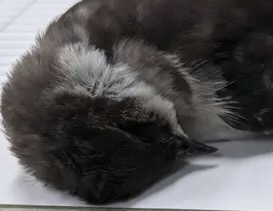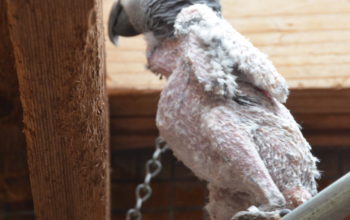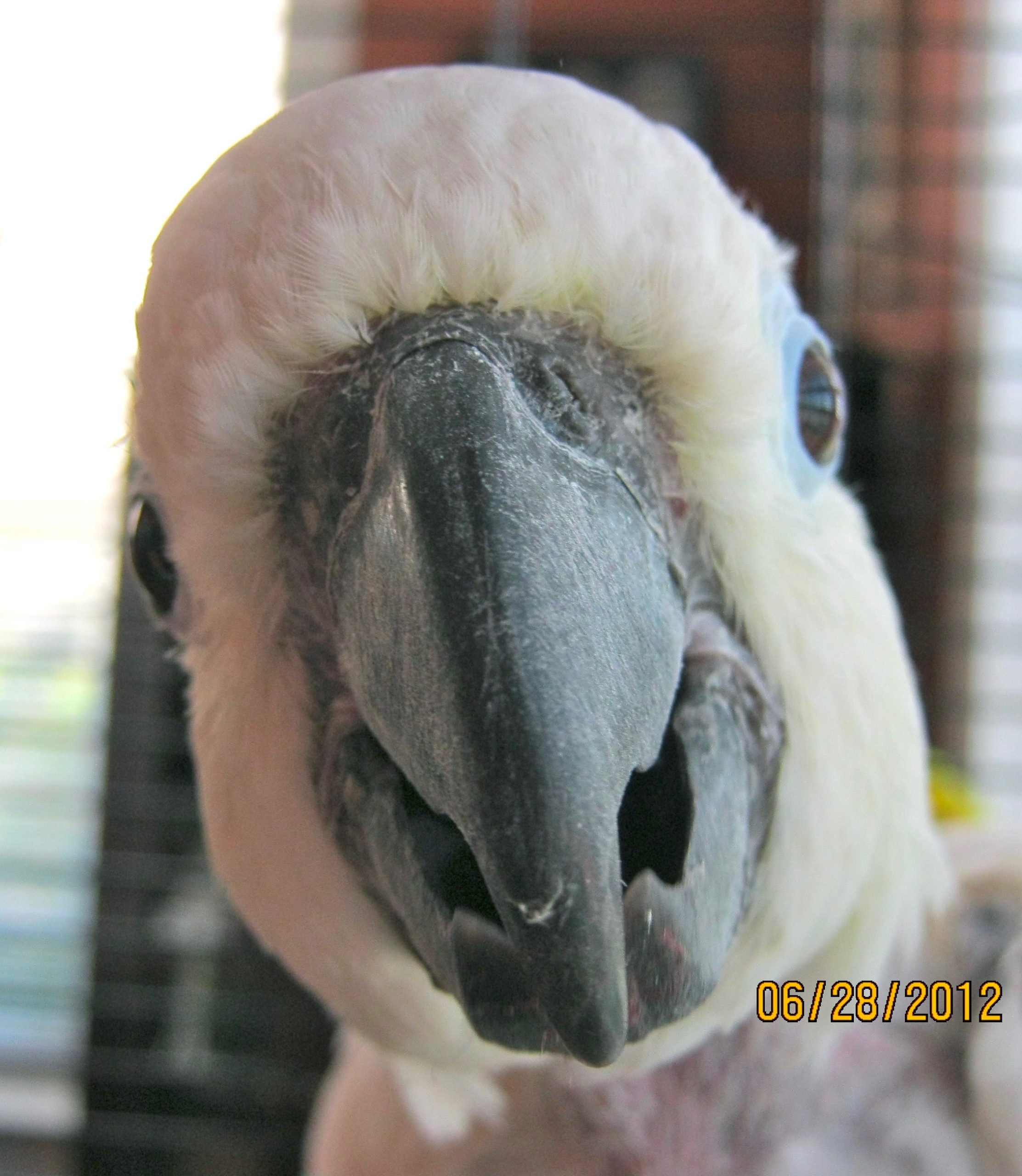I have been working with birds for decades now and had bird loving friends become desperately ill. I will not adopt a bird to anyone with a new baby, an asthmatic child or adult, for their protection. I will not adopt a bird into a household of smokers, for the birds protection. I received a phone call from more than one pulmonologist, over the years, for me to help place their patient’s bird. If you do not know the risks of having a bird, especially a cockatoo, or African grey, in your home, read on. These are the potentially life threatening risks.
The prevention of these issues is rather obvious to me. Keep your bird and it’s area clean. Don’t allow fecal material to accumulate anywhere in your environment. Don’t stir up bird dander when cleaning, and bath the bird often to minimize dander. If you can’t protect yourself and family by simply keeping the environment clean, then don’t have a bird.
Bird Fancier’s Lung
According to Wikipedia is a type of hypersensitivity pneumonitis (HP). It is triggered by exposure to avian proteins present in the dry dust of the droppings and sometimes in the feathers of a variety of birds. The lungs become inflamed, with granuloma formation. Birds such as pigeons, parakeets, cockatiels, shell parakeets (budgerigars), parrots, turtle doves, turkeys and chickens have been implicated.
People who work with birds or own many birds are at risk. Bird hobbyists and pet store workers may also be at risk. This disease is an inflammation of the alveoli in the lungs caused by an immune response to inhaled allergens from birds. Initial symptoms include shortness of breath (dyspnea), especially after sudden exertion or when exposed to temperature change, which can resemble asthma, hyperventilation syndrome or pulmonary embolism. Chills, fever, non-productive cough and chest discomfort may also occur. Upon re-exposure to avian proteins, sensitized individuals will typically experience symptoms within 4–6 hours or sooner. In the chronic form there is usually anorexia, weight loss, extreme fatigue and progressive pulmonary fibrosis, which is generally the most serious consequence of the disease because it progressively and irreversibly diminishes the lungs’ efficiency over time. As a result, sufferers may have repeated chest infections and ultimately struggle to breathe. This condition can eventually be fatal.
Do you see the very fine white powder on your furniture, particularly in the bird’s room. That is what we are talking about! The bird’s poop dries and becomes an air born powder! The dust from it’s wings becomes an air born powder, and you are inhaling it!
Psittacosis
National Organization for Rare Disorders, NORD, states Psittacosis is an uncommon infectious disease that is most often transmitted to humans through exposure to infected birds, especially parrots, cockatiels, parakeets and similar pet birds. Psittacosis can affect the lungs and may cause inflammatory illness of the lungs (pneumonia).
Histoplasmosis
The Mayo Clinic reported on Feb 20, 2020 — Histoplasmosis is an infection caused by breathing in spores of a fungus often found in bird and bat droppings. The infection is most commonly spread when these spores are inhaled after taking to the air, such as during demolition or cleanup projects.
The CDC warns :Histoplasmosis is a fungal infection that can affect anyone. Learning about histoplasmosis can help you stay healthy and recognize symptoms early if you do get the infection.
Histoplasmosis is caused by Histoplasma, a fungus that lives in the soil, particularly where there’s a large amount of bird or bat poop. The infection ranges from mild to life-threatening. It can be misdiagnosed because its symptoms are similar to those of other illnesses. Here are some important things to know about histoplasmosis.
Symptoms of histoplasmosis include:
- Fever
- Cough
- Fatigue (extreme tiredness)
- Chills
- Headache
- Chest pain
- Body aches
These symptoms usually appear between 3 and 17 days after breathing in the fungus. Because the symptoms are similar to those of other diseases, patients can experience delays in getting correctly diagnosed and treated.
Some people can develop severe histoplasmosis. These people include people who have health problems or take medicines that lower the body’s ability to fight germs and sickness (or people with weakened immune systems), and people who are exposed to a large amount of the fungus. A severe infection must be treated with prescription antifungal medicine.
However, most people who breathe in the fungus that causes histoplasmosis do not have symptoms, or only have mild symptoms. Some people never know they’ve had histoplasmosis until a CT scan, X-ray, or other imaging test shows spots on their lungs. These spots can look identical to lung cancer, leading to unnecessary costs and emotional stress associated with finding the right diagnosis.
If you have symptoms and suspect that you might have histoplasmosis, ask your doctor to test you for it.
Hypersensitivity Pneumonitis
American Lung Association states … Because of the risk of progressive chronic disease, it is important to get a prompt diagnosis. Have you have been exposed to bird droppings/do you have any birds as … Blood tests to find out if you have developed antibodies to any substances that might be causing an allergic reaction.
Hypersensitivity pneumonitis is typically divided into two types based on how long you have been affected and how severe your symptoms are.
An attack of acute hypersensitivity pneumonitis usually occurs four to six hours after a short period of intense exposure to the substance you are allergic to. You may feel as if you have caught the flu when an acute attack occurs. Common symptoms include fever, chills, muscle aches, headache and cough. These symptoms may last for as little as 12 hours to a few days and will resolve if further exposure is avoided.
Chronic hypersensitivity pneumonitis develops after numerous or continuous exposures to small amounts of the allergen. Symptoms may include shortness of breath, tiredness, coughing that lasts weeks or months and weight loss that gets progressively worse. Over time, some people with chronic hypersensitivity pneumonitis develop clubbing of fingers and toes and irreversible pulmonary fibrosis.





